This post has not been edited by the GamesBeat staff. Opinions by GamesBeat community writers do not necessarily reflect those of the staff.
Premise – what is a gamer?
More and more people play video games nowadays, but few among them enthusiastically call themselves "gamers." I notice this division within my own family. My mother used to spend hours a week playing Facebook games like Restaurant City, yet she balks at being called a gamer. Even my sister, who has played a few console titles, won't adorn the title.
I bet most new game-players don't consider themselves gamers right away. Reaching gamer status is a process — one that is paradoxically voluntary and automatic at the same time. Only a specific type of video game player makes the effort towards becoming a true gamer
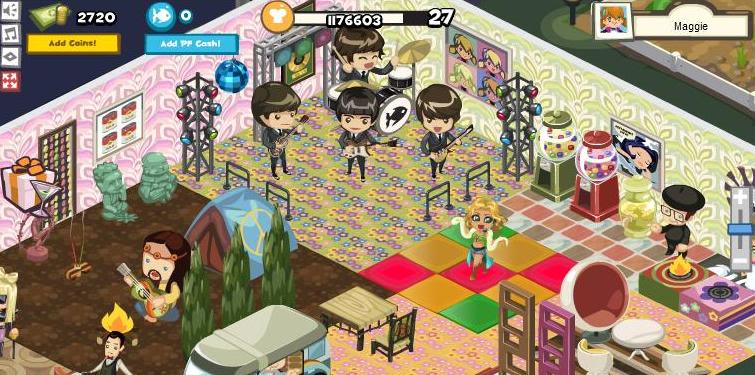
Restaurant City does not a gamer make.
The word "gamer" is self-explanatory — gamers love to play games. Of course, the term isn't a unique case; self-descriptive words arise within all forms of entertainment. Think about the labels "sports fan," "book worm," or "movie buff." Even more specific: "Trekkie/Trekker," "skater," or "D&D player." Someone who associates his or her personal identity with an activity has true love for that past-time.
Self-descriptors might seem geeky or over-enthusiastic at first, but words that show direct and personal association with an activity are important within today's leisure culture. People take pride in how they spend their free time. Given sufficient dedication, hobbies can be as important to an individual's character as nationality, religion, or sexuality.
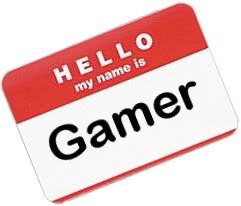
As cognitive beings, the amount of time we spend with any given activity directly influences our thoughts. Whenever we consume new media, we allow the thoughts of others to mingle with our own, changing our ideals and thinking patterns. Thus, gamers are the people who have had their minds re-wired by games, who willingly invested countless hours so that gaming may leave its indelible mark on their beings. I can personally attest to this progressive transformation. As I played more games over the course of my life, my thoughts and inclinations drifted further towards gaming. The more I played games, the more of a gamer I wanted to be, since that's the direction in which my mind took shape.
Analysis – what is Gamer Cred?
Once I knew video games had left permanent impressions upon my mind, I wanted to find out what all that time playing them had actually done to me. I thought if I could identify the fundamental qualities that make up video games, I could then discover how those influences had conditioned me into the gamer mindset.
After some reflection, I concluded that the main facets of video games are control, reward, challenge, and victory. Giving the player zero interaction hardly makes for an engaging video game, so control is a necessary aspect. Rewards — in the form of points, visuals, sounds, story progression — show up everywhere within games. Challenges and obstacles stoke the player's excitement and determination. Finally, a sense of victory is the light at the end of the tunnel; it's the goal to aim for when beating a game after an arduous play-through, or simply finishing a level to conclude the current session.
All of these values come together in what I call Gamer Cred — a declaration that "I can do all the actions of a true gamer. With it, I can master the control, get the reward, surmount the challenge, and reap the victory of any given game." Gamer Cred must be earned by oneself. It's nearly worthless, yet essential to the gamers-at-heart who hold it so dear.
Be aware, the previous explanation is only a personal one. Gamer Cred is not definite; it's based on what each gamer deems respectable in his or her mind. Each person could have a slightly different understanding of Gamer Cred, based on the values he or she has cultivated through game play.
For me, Gamer Cred comes from actions that respect my gamer ideals. Games are based on rules, ability, and competition, so it's only natural for gamers to display their skills somehow. Gamer Cred is that way. It's not something tangible, redeemable, or exchangeable, but it's the purest form of achievement that a gamer can pursue.
Reasons – why Super Mario Bros.?
Since I started playing video games over fifteen years ago, there has been one game that I needed to beat for validation of my Gamer Cred at its most basic level. That game is, of course, Super Mario Bros.
Super Mario Bros. comes easily as my initial high-water mark for Gamer Cred. Perhaps the most famous game of all, it has risen above mere video game culture and surfaced as a part of common pop-culture. The Super Mario Bros. theme owns a nearly synonymous familiarity among today's younger generations. I've heard a professional DJ mix the Super Mario Bros. Overworld and Underworld themes with a Kanye West song. Few other games have that level of notoriety.
Super Mario Bros. is so well known among my generation, and not just the gaming population, that anyone can immediately identify with it, and hopefully acknowledge my acquisition of Cred. "Oh, you beat Super Mario Bros.? Cool, dude. I know that game…Great job!" There are most likely people who would never label themselves as gamers, and even they have beaten this game already. I hastened myself to join their ranks; my Gamer Cred was at stake.
Training – working myself up to the Cred
I must admit, Super Mario Bros. was actually a challenge when I began my practice runs. After repeated failures and futile attempts, my mind began to slip, and the game appeared to mock me. The combination of World-Course numbers and my life count on the pre-level splash screen took the shape of cruel faces, taunting my inability to advance in the game. With enough effort though, the demons subsided and I was able to progress.
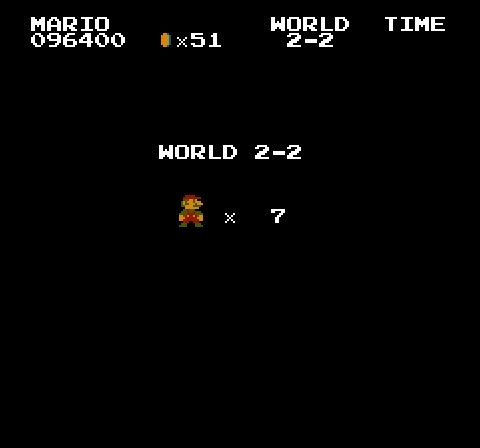
Damn you face, with eyes of 2 and mouth of 7, quit mocking me!
It took me a dozen tries before I could reach the final World. Slowly and patiently, I developed strategies. I began to meticulously improve upon coin-grabbing runs, in which I advanced through the levels while collecting as many coins as possible, to earn a maximum of extra lives. This allowed me to inch farther and farther into the game as I ventured to new levels and learned of their hazards. Yet that method only worked for so long; by the final Worlds, coin-grabbing should be abandoned entirely. In those last few levels, it was tough to find another power-up mushroom, never mind the 100 coins for an extra life.
With enough practice, I found myself developing a "Mario Memory" — similar to muscle memory, but triggered within the game instead of within the body. Mario Memory comprises essential knowledge of the level layouts, such as "this jump can be made without a running start," or "wait for two enemies before jumping on this platform."
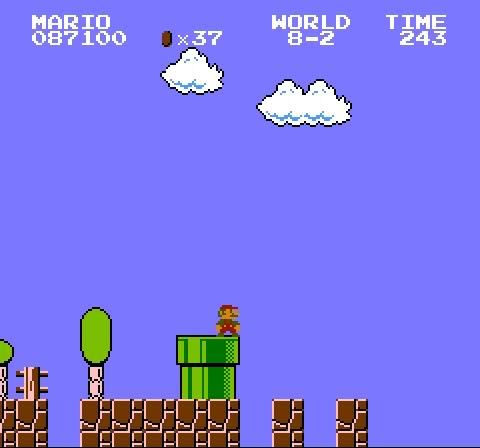
My Mario Memory soon put to the test.
Vital to one's Mario Memory is the progression inside the maze-like castles in Worlds 4, 7, and 8. Memorizing their patterns is a must to reach the end with a healthy amount of lives. Plus, it doesn't hurt to make a note of hidden secret locations (extra lives, secret vines, and bonus pipes) that you may stumble across. Knowing the placement of these areas greatly enhances Mario's survival and your chance of avoiding another Game Over screen.
Play-through – earning that Gamer Cred
I will now recount to you the happenings of the Super Mario Bros. run that earned my long-awaited Gamer Cred. After months of on-and-off training, I sat down one fateful day on Easter weekend and began to play my Virtual Console copy of Super Mario Bros., just like all the other failed attempts before.
What first gave me confidence during this run was that I did not lose a life on either of the absolute worst levels in the game (do I need to say it? The flying Cheep-Cheep levels at 2-3 and 7-3). In fact, I had not died at all from 1-1 all the way to 7-3. I had been coin-grabbing on full and reached the auspicious-looking "crown," which appears with ten or more lives, since the game isn't properly coded to display that many.
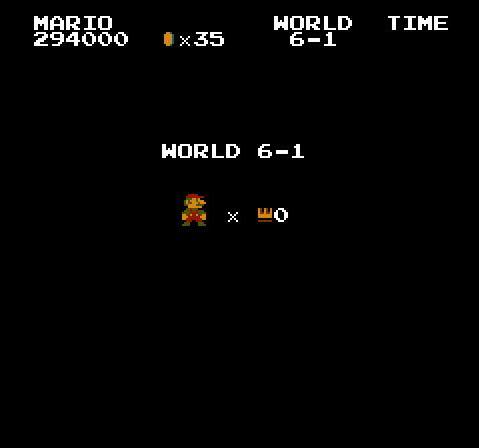
I think this is a good sign.
My heart racing, I wondered if my first time beating Super Mario Bros. would be a masterful no-death run. Alas, it didn't happen, as my hopes were smashed by a flying Koopa in level 8-2. I was running after a free life and died because of it — too greedy! I then sustained three more deaths on 8-2 by falling into a hole, dying to the underside of a Spiny tossed by the cloud Lakitu, and colliding with a Buzzie Beetle. I eventually made it to 8-3, and amazingly, finished that Course without a single death.
Facing 8-4, the last level, I had 11 lives and a case of sweaty palms. My first run through the 8-4 castle ended in an odd way. I collided with an invisible coin block and, on the way down, I ran into a winged Koopa. My second death came when I jumped into another Koopa. "Okay," I said to myself. "I've had enough of these Koopas. Time to go for the kill." Yes…I actually said that. With my honed platforming skills and accumulated Mario Memory, I successfully made my way through the perilous castle and gave Bowser what he had coming. Finally, I heard the 8-bit music of glorious victory that chimes at the end of the last castle. After more than ten years of saying I was a gamer, I had finally proven it.
Outcome – the sweet smell of Cred
Now in possession of my Gamer Cred, I can beat Super Mario Bros. with ease. I managed to beat the more difficult "New Quest" in the same sitting as my second beat of the Original Quest. It seems like I had to cross only a single boundary to reach consistent proficiency. The whole game is now familiar territory. I can say "I've been there, jumped over those fireballs, hit those coin blocks." Those movements are now part of my gaming lexicon. I exhibited the true mark of a gamer, and the title is now a little more justly deserved.
(Originally posted on 1UP.com)
For the comments:
- What does Gamer Cred mean to you?
- Which games have earned you Gamer Cred?
- Have you ever developed an equivalent to "Mario Memory" in another game?
